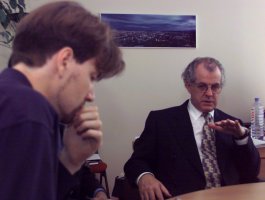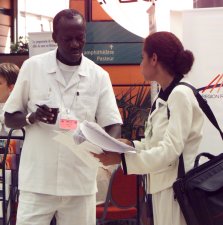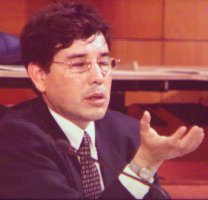 |
|
 Highlights
from Thursday, 14 September Highlights
from Thursday, 14 September
Contact groups
met throughout the day to consider: the mechanisms; land use, land-use
change and forestry (LULUCF); technology transfer; adverse effects;
capacity building; and guidelines under Protocol Articles 5 (methodological
issues), 7 (communication of information) and 8 (review of information).
The Joint Working Group on Compliance convened to continue discussions
on the Co-Chairs' text. A special meeting on LULUCF and the CDM
was also held.
Photos:
UNFCCC Executive Secretary Michael Zammit Cutajar during an
interview with ENB writers. Zammit Cutajar spoke about progress
made at SB-13, activities leading up to and expectations for COP-6.
|
| Special
Session on LULUCF and the CDM |
In a special
session, delegates considered the issue of including LULUCF projects
within the CDM. Concerns with the inclusion of LULUCF CDM projects
included: uncertainty; leakage; non-permanence; methodological
issues in determining baselines; the potential for promoting inappropriate
forestry; geographic and inter-generational inequity; and the
potential size of LULUCF CDM credits enabling avoidance of emissions
reductions. Arguments in favor of CDM projects included: their
potential contribution to sustainable development in developing
countries, and the importance of carbon sequestration. Proponents
of LULUCF projects argued that many of the technical concerns
are not unique to sinks projects, and that they may be addressed
through appropriate project design. They suggested that the key
distinguishing feature of sinks projects is permanence. Right:
LULUCF
Co-Chair Philip Gwage (on the left)
|
|
|
The US argued that in most respects, LULUCF projects were
no different from other non-sink projects. He outlined the US proposal
addressing concerns relating, inter alia, to baselines monitoring
and leakages.
|
|
|
|
Bolivia expressed sympathy to AOSIS concerns and underlined the
need to address uncertainty. |
Samoa reminded
delegates of the key issues to consider: storms; droughts and
sea level rise. She recalled that the focus of the agreement was
on reducing CO2 emissions by 2005 and that in 1992 there was still
the expectation that these targets were realistic. She argued
forcefully against the inclusion of LULUCF projects in the CDM,
citing concerns related to North-South and intergenerational equity.
|
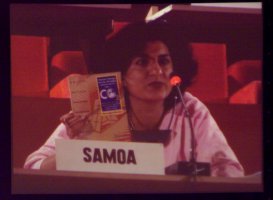 |
|
|
Arguing
in favor of LULUCF projects in CDM, Brazil supported Bolivia's
earlier submission from "an astrophysical perspective."
Jamaica made a passionate appeal against sinks in the CDM, highlighting
concerns regarding permanence and leakage. He questioned incremental
gains were worth the risk of uncertainty and asked whether delegates
would be prepared to sail a boat without taking precautions to avoid
the boat being punctured.
|
 |
| Development
and Transfer of Technology |
Delegates
discussed the Co-Chairs' draft conclusions, noting that limited
progress had been made in elaborating the elements for a draft
framework to enhance the implementation of FCCC Article 4.5 (technology
transfer). Right: Acting Chair Anthony Adegbulugbe (right)
discussing the text on technology transfer
|
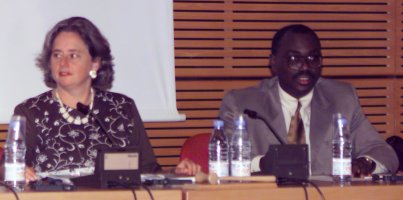
|
|
|
The Intergovernmental
Panel for Climate Change Table
The IPCC's
"Good Practices Guidance and Uncertainty Management in National
Greenhouse Gas Inventories" will be available at COP-6. It
is currently available in PDF format at
www.ipcc-nggip.iges.or.jp
Also available
on CD-Rom at COP-6 will be reports on: LULUCF; Emissions Scenarios;
Methodological and Technological Issues in Technology Transfer;
and Sectoral Economic Costs and Benefits of Greenhouse Gas Mitigation.
Currently, hard copies are available.
|
In
the corridors...
Some observers expressed
concern Thursday regarding the process used in formulating and presenting
some conclusions and decisions in the contact groups. They alleged that
some text that had not been discussed previously was "slipped in surreptitiously,"
while in other cases Parties' submissions appeared to have been "conveniently
ignored." However, others noted that it was an arduous task to cope with
the various group texts and proposals emerging.
|



